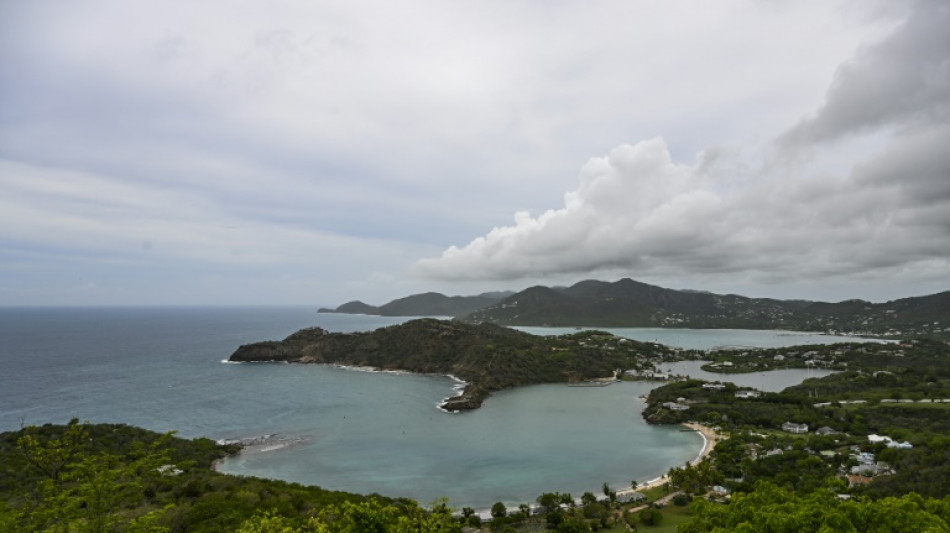
-
 Kremlin says agreed to halt strikes on Kyiv until Sunday
Kremlin says agreed to halt strikes on Kyiv until Sunday
-
Carrick calls for calm after flying start to Man Utd reign

-
 Djokovic to meet Alcaraz in Melbourne final after five-set marathon
Djokovic to meet Alcaraz in Melbourne final after five-set marathon
-
Italian officials to testify in trial over deadly migrant shipwreck

-
 Iran says defence capabilities 'never' up for negotiation
Iran says defence capabilities 'never' up for negotiation
-
UN appeals for more support for flood-hit Mozambicans

-
 Lijnders urges Man City to pile pressure on Arsenal in title race
Lijnders urges Man City to pile pressure on Arsenal in title race
-
Fulham sign Man City winger Oscar Bobb

-
 Strasbourg's Argentine striker Panichelli sets sights on PSG, World Cup
Strasbourg's Argentine striker Panichelli sets sights on PSG, World Cup
-
Jesus 'made love': Colombian president irks Christians with steamy claim

-
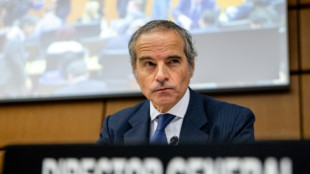 IAEA board meets over Ukraine nuclear safety concerns
IAEA board meets over Ukraine nuclear safety concerns
-
Eurozone growth beats 2025 forecasts despite Trump woes

-
 Dutch PM-elect Jetten says not yet time to talk to Putin
Dutch PM-elect Jetten says not yet time to talk to Putin
-
Social media fuels surge in UK men seeking testosterone jabs

-
 Forest face Fenerbahce, Celtic draw Stuttgart in Europa League play-offs
Forest face Fenerbahce, Celtic draw Stuttgart in Europa League play-offs
-
US speed queen Vonn crashes at Crans-Montana, one week before Olympics

-
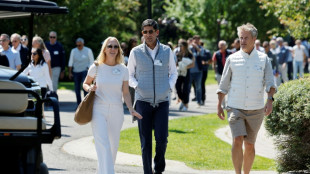 Trump nominates former US Fed official as next central bank chief
Trump nominates former US Fed official as next central bank chief
-
New Dutch government pledges ongoing Ukraine support
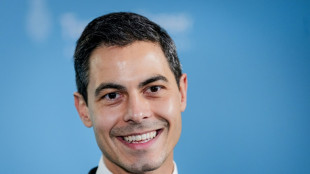
-
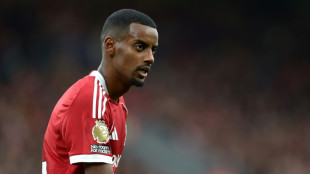 Newcastle still coping with fallout from Isak exit, says Howe
Newcastle still coping with fallout from Isak exit, says Howe
-
Chad, France eye economic cooperation as they reset strained ties
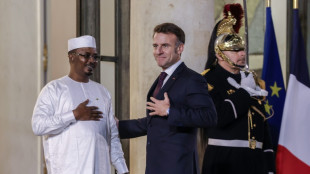
-
 Real Madrid to play Benfica, PSG face Monaco in Champions League play-offs
Real Madrid to play Benfica, PSG face Monaco in Champions League play-offs
-
Everton winger Grealish set to miss rest of season in World Cup blow

-
 Trump brands Minneapolis nurse killed by federal agents an 'agitator'
Trump brands Minneapolis nurse killed by federal agents an 'agitator'
-
Arteta focuses on the positives despite Arsenal stumble

-
 Fijian Drua sign France international back Vakatawa
Fijian Drua sign France international back Vakatawa
-
Kevin Warsh, a former Fed 'hawk' now in tune with Trump

-
 Zverev rails at Alcaraz timeout in 'one of the best battles ever'
Zverev rails at Alcaraz timeout in 'one of the best battles ever'
-
Turkey leads Iran diplomatic push as Trump softens strike threat

-
 Zelensky backs energy ceasefire, Russia bombs Ukraine despite Trump intervention
Zelensky backs energy ceasefire, Russia bombs Ukraine despite Trump intervention
-
'Superman' Li Ka-shing, Hong Kong billionaire behind Panama ports deal

-
 Skiing great Lindsey Vonn crashes at Crans-Montana, one week before Olympics
Skiing great Lindsey Vonn crashes at Crans-Montana, one week before Olympics
-
Slot warns Liverpool 'can't afford mistakes' in top-four scrap

-
 Paris show by late Martin Parr views his photos through political lens
Paris show by late Martin Parr views his photos through political lens
-
Artist chains up thrashing robot dog to expose AI fears

-
 Alcaraz outlasts Zverev in epic to reach maiden Australian Open final
Alcaraz outlasts Zverev in epic to reach maiden Australian Open final
-
French PM forces final budget through parliament

-
 French-Nigerian artists team up to craft future hits
French-Nigerian artists team up to craft future hits
-
Dutch watchdog launches Roblox probe over 'risks to children'

-
 Trump brands Minneapolis nurse shot dead by federal agents an 'agitator'
Trump brands Minneapolis nurse shot dead by federal agents an 'agitator'
-
Israel says killed 'three terrorists' in Gaza

-
 After Trump-fueled brawls, Canada-US renew Olympic hockey rivalry
After Trump-fueled brawls, Canada-US renew Olympic hockey rivalry
-
Eileen Gu - Olympic champion who bestrides rivals US, China

-
 Trump, first lady attend premier of multimillion-dollar 'Melania' documentary
Trump, first lady attend premier of multimillion-dollar 'Melania' documentary
-
US Senate eyes funding deal vote as government shutdown looms

-
 Cuddly Olympics mascot facing life or death struggle in the wild
Cuddly Olympics mascot facing life or death struggle in the wild
-
UK schoolgirl game character Amelia co-opted by far-right

-
 Anger as bid to ramp up Malaysia's football fortunes backfires
Anger as bid to ramp up Malaysia's football fortunes backfires
-
Panama court annuls Hong Kong firm's canal port concession

-
 Pioneer African Olympic skier returns to Sarajevo slopes for documentary
Pioneer African Olympic skier returns to Sarajevo slopes for documentary
-
Trump threatens tariffs on nations selling oil to Cuba

| VOD | -0.17% | 14.685 | $ | |
| RYCEF | -2.69% | 16 | $ | |
| RELX | -0.81% | 35.875 | $ | |
| CMSC | -0.21% | 23.645 | $ | |
| BTI | -0.13% | 60.13 | $ | |
| NGG | -0.1% | 84.965 | $ | |
| RIO | -2.64% | 92.68 | $ | |
| AZN | 0.39% | 92.95 | $ | |
| GSK | 1.21% | 51.275 | $ | |
| RBGPF | 1.65% | 83.78 | $ | |
| CMSD | 0.17% | 24.1 | $ | |
| JRI | 0.27% | 12.99 | $ | |
| BP | 0.42% | 38.2 | $ | |
| SCS | 0.12% | 16.14 | $ | |
| BCC | -1.57% | 78.93 | $ | |
| BCE | 0.14% | 25.52 | $ |

World's island states meet to confront climate, fiscal challenges
Extremely vulnerable to climate change, not rich enough to stop it on their own, and not poor enough to depend on aid and development financing: the world's small island countries are bracing for both fiscal and climate shocks.
Both will be high on the agenda this week as Small Island Developing States (SIDS), as they're formally known, meet Monday at their fourth UN Conference, in the Caribbean nation of Antigua and Barbuda.
Caught between rising debts and rising oceans, from the Caribbean to Africa to the Pacific, many SIDS share characteristics that make them especially vulnerable to external shocks: small landmasses home to scattered and isolated populations, with import dependent, non-diversified economies.
And climate change -- with its brutal droughts, powerful hurricanes and rising seas -- is threatening to erase some of them from the map altogether.
"The next ten years are critical for SIDS," reads the draft document set to be adopted at the UN conference, which will bring together countries ranging from Asian economic heavyweight Singapore to Cape Verde in Africa to the Bahamas.
High on the agenda for the 39 states, whose populations number roughly 65 million people: increasing climate financing, even as many criticize the slow pace of fulfilling previous UN aid pledges.
"The harsh truth is for these countries, climate change is already a reality," Achim Steiner, head of the UN Development Program (UNDP), told AFP. "Because of their smallness as economies... one extreme weather event can literally throw a country back 5-10 years in its development."
"One hurricane, one typhoon that crosses -- by sheer lottery of bad luck -- the terrain of a small island developing state can wipe out a third or more of the entire infrastructure of a country."
But most small island states are classified as middle-income countries or higher -- meaning that they're unable to access international aid and preferential financing available to the world's poorest countries.
Additionally, many already are also facing strained debt loads. As a whole, the UN estimates SIDS will spend 15.9 percent of government revenues in 2024 on interest alone.
"They are being trapped in a no man's land where financing from the international community that is often a kind of safety net is simply not available to them," Steiner said.
According to the UNDP, some $4.7-7.3 billion in financing is needed per year just for climate adaptation measures in SIDS countries.
"SIDS cannot be left to drown in crises not of their own making. This would have catastrophic consequences for the entire world," said Fatumanava-o-Upolu III Dr Pa'olelei Luteru, Samoa's ambassador to the UN.
- 'Blue economy' -
Beyond seeking outside aid, however, many are also turning toward reforming their own economies.
Priorities include developing renewable energy sectors and engaging in the so-called "blue economy" of sustainable fishing and ocean conservation -- a serious opportunity for SIDS countries, which account for 19 percent of the world's Exclusive Economic Zones.
Tourism, too, can be made more sustainable -- though the specter of climate change hangs over these countries' marine biodiversity and coral reefs, which draw scuba divers from across the world.
Even just getting there has increasingly come under scrutiny as airplane travel comes under fire for its heavy emissions -- a sort of "double punishment," said Steiner.
The effects of climate change also overlap with other issues many poor or otherwise marginalized people in small island countries face, which must be confronted domestically, said Nicole Leotaud, executive director of the Caribbean Natural Resources Institute.
"They are already marginalized because they are poor," she said. "They are already marginalized because of their gender or their race."
"And these climate impacts are another layer of injustice to these people."
F.Stadler--VB



